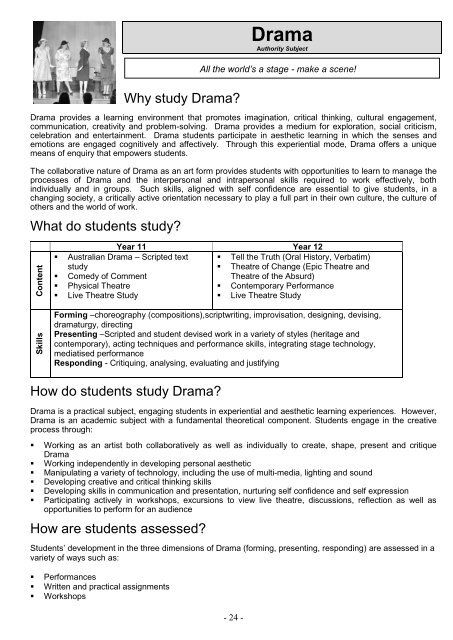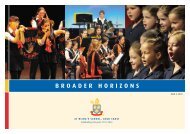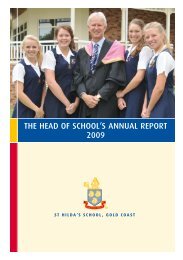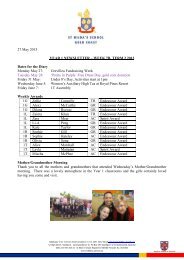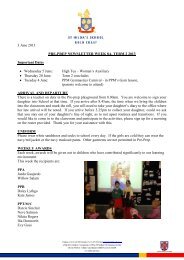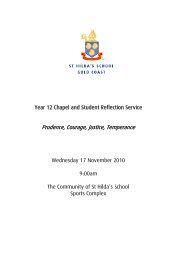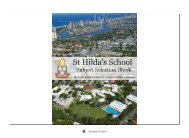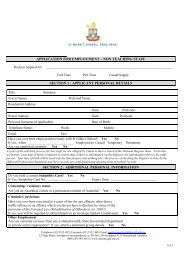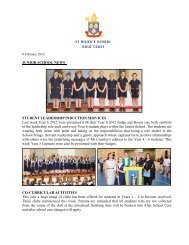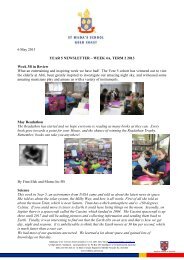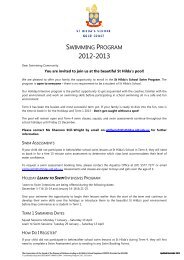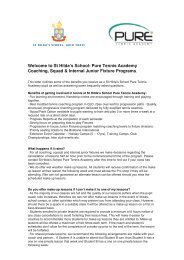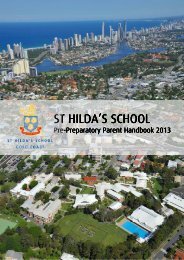subject booklet for year 11-12 - St Hildas School
subject booklet for year 11-12 - St Hildas School
subject booklet for year 11-12 - St Hildas School
Create successful ePaper yourself
Turn your PDF publications into a flip-book with our unique Google optimized e-Paper software.
Content<br />
Skills<br />
Drama<br />
Authority Subject<br />
Why study Drama?<br />
Drama provides a learning environment that promotes imagination, critical thinking, cultural engagement,<br />
communication, creativity and problem-solving. Drama provides a medium <strong>for</strong> exploration, social criticism,<br />
celebration and entertainment. Drama students participate in aesthetic learning in which the senses and<br />
emotions are engaged cognitively and affectively. Through this experiential mode, Drama offers a unique<br />
means of enquiry that empowers students.<br />
The collaborative nature of Drama as an art <strong>for</strong>m provides students with opportunities to learn to manage the<br />
processes of Drama and the interpersonal and intrapersonal skills required to work effectively, both<br />
individually and in groups. Such skills, aligned with self confidence are essential to give students, in a<br />
changing society, a critically active orientation necessary to play a full part in their own culture, the culture of<br />
others and the world of work.<br />
What do students study?<br />
All the world’s a stage - make a scene!<br />
Year <strong>11</strong> Year <strong>12</strong><br />
• Australian Drama – Scripted text<br />
study<br />
• Comedy of Comment<br />
• Physical Theatre<br />
• Live Theatre <strong>St</strong>udy<br />
• Tell the Truth (Oral History, Verbatim)<br />
• Theatre of Change (Epic Theatre and<br />
Theatre of the Absurd)<br />
• Contemporary Per<strong>for</strong>mance<br />
• Live Theatre <strong>St</strong>udy<br />
Forming –choreography (compositions),scriptwriting, improvisation, designing, devising,<br />
dramaturgy, directing<br />
Presenting –Scripted and student devised work in a variety of styles (heritage and<br />
contemporary), acting techniques and per<strong>for</strong>mance skills, integrating stage technology,<br />
mediatised per<strong>for</strong>mance<br />
Responding - Critiquing, analysing, evaluating and justifying<br />
How do students study Drama?<br />
Drama is a practical <strong>subject</strong>, engaging students in experiential and aesthetic learning experiences. However,<br />
Drama is an academic <strong>subject</strong> with a fundamental theoretical component. <strong>St</strong>udents engage in the creative<br />
process through:<br />
• Working as an artist both collaboratively as well as individually to create, shape, present and critique<br />
Drama<br />
• Working independently in developing personal aesthetic<br />
• Manipulating a variety of technology, including the use of multi-media, lighting and sound<br />
• Developing creative and critical thinking skills<br />
• Developing skills in communication and presentation, nurturing self confidence and self expression<br />
• Participating actively in workshops, excursions to view live theatre, discussions, reflection as well as<br />
opportunities to per<strong>for</strong>m <strong>for</strong> an audience<br />
How are students assessed?<br />
<strong>St</strong>udents‟ development in the three dimensions of Drama (<strong>for</strong>ming, presenting, responding) are assessed in a<br />
variety of ways such as:<br />
• Per<strong>for</strong>mances<br />
• Written and practical assignments<br />
• Workshops<br />
- 24 -


